COMPARISONS of LANGUAGES INVOLVED
in the translation of the MAALAN AARUM |
| INTRODUCTION |
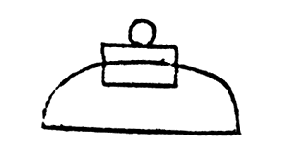
3.1 |
|
| Maalan Aarum |
Algonquin |
Old Norse |
Pehella
wtenk
lennapewi
tulapewini
psakwiken
woliwikgun
wittank
talli |
Pemi kegw
witawemin'k
linapiwi
touappu
win pasak wikia
woalau wiquom
wit aw emin 'k
talli |
Brima kygva
vidh aa vina 'k
hreina buui
daufrby
van basa thak viikja
hola veik inn
vidh aa vina 'k
thar ii |
 |
|
 |
After the rushing waters
were close together
Lenape of the
turtle
?missing?
in hollow houses living
together
there |

original English
translation

translation
of Old Norse |
(waves) surging gently
"I (stay) with friend"
(people who) are decent
deserted (solitude)
under thick roof stronghold
hollow to return (to)
"I (stay) with friend"
there in |
WORD (PHRASE) BY WORD (PHRASE) DECIPHERMENT
(All references are to Sherwin’s eight volumes of the Viking and the Red Man) |
| Original English |
After the rushing waters |
|
| Recorded sounds |
Pe he ll a |
1* |
| Algonquin words |
Pemi kegw |
v. 5 p. 104 |
| Old Norse |
Brima kygva |
WO retains last "a" 2* |
| Norse/English |
(waves) Surging gently |
|
| |
|
|
| Original English |
were close together |
English word order changed 3* |
| Recorded sounds |
w t en k |
"k" sound could have been "ek" (I) |
| Algonquin words |
wit aw emin 'k |
v. 1 p.241-242 4* |
| Old Norse |
vidh aa vina 'k |
|
| Norse/English |
"I (stay) with friend" |
5* |
| |
|
|
| Original English |
lenape of the |
|
| Recorded sounds |
lennapewi |
|
| Algonquin words |
lin a piwi |
v. 1 p. 169 |
| Old Norse |
hreina buui |
6* |
| Norse/English |
(people who) are decent |
|
| |
|
|
| Original English |
turtle |
Appears to be wrong word 7* |
| Recorded sounds |
tulapewini |
Wini is a prefix. V. 1 p. 240 8* |
| Algonquin words |
tou a ppu |
v. 3 p.127 |
| Old Norse |
dau fr by |
Correct Algonquin/Norse words |
| Norse/English |
deserted (solitude) |
|
| |
|
|
| Original English |
?missing? |
9* |
| Recorded sounds |
wini p s ak wiken |
Wini is a prefix V.1 p.240 |
| Algonquin words |
win pas ak wiken |
v. 1 p 240, 150 & 237 |
| Old Norse |
van basa thak vikja |
|
| Norse/English |
under thick roof stronghold |
10* |
| |
|
|
| Original English |
in hollow houses living |
|
| Recorded sounds |
woli wikgun |
|
| Algonquin words |
woalau wiquom |
v. 1 p. 237 & 243 |
| Old Norse |
ho la veik inn |
|
| Norse/English |
hollow to return (to) |
11* |
| |
|
|
| Original English |
together |
12* |
| Recorded sounds |
witt a n'k |
"k" sound could have been "ek" (I) |
| Algonquin words |
wit aw emin 'k |
v. 1 p.241-242 |
| Old Norse |
vidh aa vina 'k |
|
| Norse/English |
"I (stay) with friend" |
|
| |
|
|
| Original English |
there |
|
| Recorded sounds |
talli |
|
| Algonquin words |
talli |
v. 1 p195 |
| Old Norse |
thar ii |
|
| Norse/English |
there in |
|
| back to top |
Notes |
1* Maalan Aarum/Walam Olum words are spaced out to match Old Norse syllables.
|
| 2* The Old Norse "a" may have been retained by memory, while it fell from common Algonquin use. |
3* The order of the MA/WO English phrases was changed to match the MA/WO words. |
4* The "'k" sound is often dropped in Algonquin. |
5* "I (stay) with friend" appears to be an idiom for "together." |
6* Sherwin gives many examples to show that "lenn" came from "hrein." |
7* Rafinesque may have guessed "tul" meant "Turtle" from the Algonquin word "Tulpe," meaning “sea turtle.” |
8* Many Algonquin words show "wini" as a prefix. So, wini was added to next word. |
| 9* May have been an honest omission, but may have been left out because "under thick roof stronghold" was not a believable statement to Rafinesque. |
| 10* If this phrase had been written in English, comparison to Norse housing in Greenland may have occurred sooner. |
| 11* "Veik" in Old Norse is often associated with home and with returning (to home). |
| 12* The two "together" words, spelled differently but meaning the same thing, appear to be evidence that the Lenape Historian and the Moravian recorder of the sounds had verbal communication difficulties. |
| back to top |
|

3:2 |
They lived where it snowed.
They lived where it stormed.
They lived where it was always winter. |

3:3 |
While still in their cold land
They remembered longingly
the mild weather,
the many deer,
and also foxes |
| HUNTERS GO EVERYWHERE |
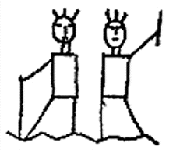
3:4 |
The poor, lonely, but tough men
became hunters and
left those living
in strong houses.
|

3:5 |
Separated from home
like breasts on the same body
the hunters became tougher
extremely good and
they reached for the sky. |

3:6 |
The hunters camped
in the north, east,
south and west. |
| CHRIST TRUMPS ODIN |
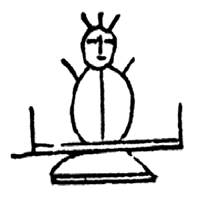
3.7 |
The man, who ruled
in that old, northern land
that they all left,
was baptized to be pure. |
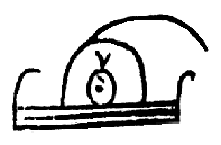
3.8 |
The discouraged people
were worried about
worn out land
they had to abandon.
The priest said,
"We decent people
should go somewhere else."
|
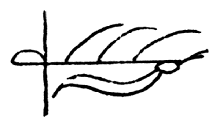
3.9 |
The common people
in the east stole away
the brothers
abandoned all
with great discouragement
and again discouragement |

3.10 |
In a short while
the weeping, weak, dirty.
needy (people from)
the burnt land
saved themselves and
rested on the other side |

3.11 |
After moving down
from the snowy land
and discreetly leaving
the cousins separated
through out all the land |
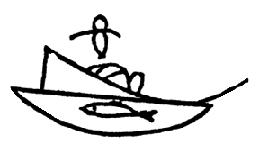
3.12 |
Where there was little
pack ice in heaped ice
with a lot of snow drifts,
the white geese ruled
and the white bear ruled |
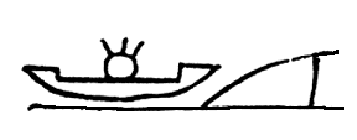
3.13 |
Floating up the streams
in their canoes,
our fathers were rich.
They were in the light
when they were at these Islands. |
| THE DECISION |

3.14 |
"Head Beaver and Big Bird
said 'Let us go to Akomen'" |
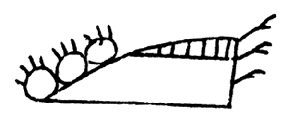
3.15 |
All say they will go along,
All who are free to go. |
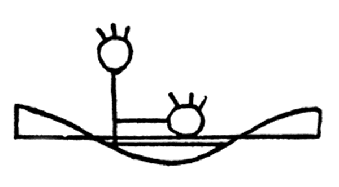
3.16
|
Those of the north agreed.
Those of the east agreed.
Over the waters
Over the frozen sea
They went to enjoy it |
| THE MIGRATION |

3.17 |
On the wonderful slippery water,
On the stone hard water, all went
On the great tidal sea,
Over the [puckered pack ice] |
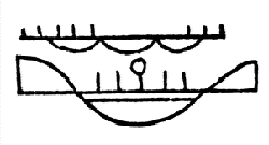
3.18
|
[I tell you it was a big mob]
In the darkness,
all in one darkness
To Akomen, to the [west],
In the darkness
They walk and walk,
all of them |
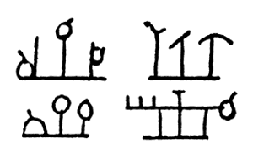
3.19 |
The men from the north,
the east, the south,
The eagle clan, the beaver clan
the wolf clan,
The best men, the rich men,
the head men
Those with wives,
Those with daughters,
Those with dogs |

3.20 |
They all come.
They tarry at the land
Of the spruce pines,
Those from the east
Some with hesitation.
Esteeming highly their
Old home at the mound land |



















